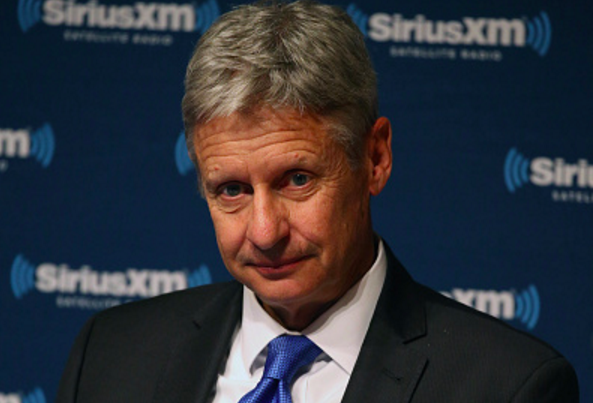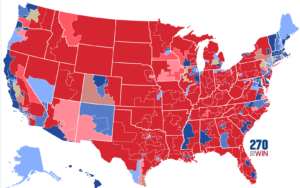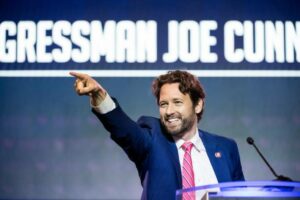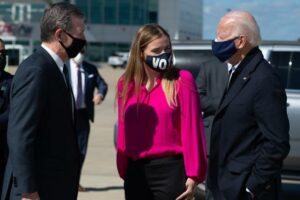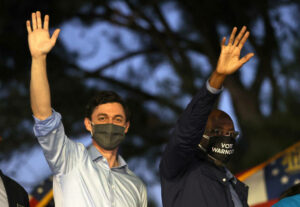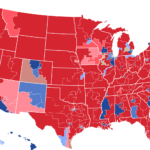Poll after poll has shown that Hillary Clinton and Donald Trump are the two most unpopular major party nominees in American history. Yet as election 2016 draws to a close, it’s clear that the Democratic and Republican party nominees will receive a vast majority of votes cast, and the only third party candidate with a real chance of impacting the race is Evan McMullin, who has only focused on winning one state (Utah), and isn’t even on the ballot in enough states to win outright.
Former New Mexico Governor Gary Johnson and his running mate, former Massachusetts Governor Bill Weld, are both ex-Republicans who sought and accepted the Libertarian nomination on the premise that they would be able to woo disaffected voters, particularly disaffected Republicans, independents, and young people to the Libertarian Party (LP). Despite 50 state ballot access and record fundraising, Johnson and Weld have still run a disappointing campaign, and in the end their polling average is unlikely to break 8% nationally by election day, with their end result likely to be worse, given that historically 3rd party candidates finish at half or a third of their polling averages.
Johnson and Weld have a history of governing, and electoral success in their states, but in this campaign they have been reduced to a novelty act, drawing headlines for either Johnson’s erratic temperament and gaffes, or Weld’s shadow campaign against Donald Trump taking priority over his own supposed campaign for the vice presidency. In a year where the Libertarians could have come close to challenging Ross Perot’s modern record 1992 result for a non-major party candidate, the LP has instead been reduced to angling for the 5% mark, assuming their own ideology doesn’t prevent them from taking the FEC funding that would come with it in the next Presidential campaign.
In 2012 Johnson pulled 1.2 million votes, and presuming that the LP will likely finish somewhere in the 3-5% range nationally this year, he could pull as many as 4 or 5 million votes. The issue for the Libertarian Party is that not many of those new voters are likely to be long term LP supporters, or participate in supporting the party in an active way; rather, they are just looking for an alternative to Clinton and Trump on their ballot, and Johnson is the one who is on the ballot in every state. He also has more media coverage and money than his Green Party rival Jill Stein, and there are more conservatives and Republicans angered by Trump than Democrats who are angered by Clinton at this point. Also, Libertarian ideology probably speaks more to the disaffected moderate voters than the far-left Green Party ideology. The polling for Stein shows that “Bernie or Bust” wasn’t a large movement by any means. Johnson also has no chance of winning a state, and with it the first electoral vote for a third party candidate since George Wallace in 1968. There was talk of New Mexico, Utah, and some of the other western states being targets for the campaign, but there is no evidence on the ground that Johnson is anywhere close in those states.
So with the field set, where did it all go wrong for Johnson/Weld? First of all, the campaign never seemed to have a clear message, or a clear group of targeted voters in mind. Johnson and Weld had to deal with Libertarian activists in the party base who were concerned about some of their less than Libertarian positions and governing background. Though they survived that test at the convention, they never seemed to pivot towards a coherent general election message, outside of the typical third party messages of “more choices,” “fresh ideas,” and their governing experience.
Johnson has polled best with young people and independents, but it’s not clear how much his ID’ed “voters” actually know about him and his issue positions. Outside of his advocacy for marijuana policy reform, even I’m not fully sure what Johnson and Weld’s governing priorities would be. They did little to make a case on the issues, and that’s part of their poll number decline at this point. Johnson should have focused on making himself the voice of a bloc or blocs of voters, much as Bernie Sanders was able to do with young progressives in particular. A lot of this comes down to Johnson keeping a campaign staff from his 2012 run that may not have been ready for primetime in 2016.
That lack of coherent messaging or voter targeting leads into my next point. Johnson and Weld never made a clear case as to why they were running, and why people should vote for them. It was never made clear if they had a plan and were working to win the White House, were just running to draw attention to a set of issues and give voters a choice, wanted to get to 5% and earn that FEC money, or to spoil the election for a specific candidate they preferred (i.e. Clinton over Trump for Weld). Without making it clear why they deserve a vote, it’s clear most voters didn’t think they deserved one either.
Depending on what their actual strategy was, it would have been helpful if they had focused their efforts less so on a national campaign, and more on a set of states, such as the western states, where the media markets are inexpensive and voters would have been most receptive. The one advantage of a well-funded third party campaign, which Johnson/Weld was by any standard, is that nationwide only voters in a dozen or so states ever get contacted or pushed by a Presidential campaign; that means most of America would relish attention from actual candidates, such as Johnson/Weld. If they had focused on, say, Montana, and done outreach on campuses in the state, festivals etc., they could have made a mark and made themselves matter in the 2016 race, but instead they will be a somewhat irrelevant third-place finisher in 40+ states that the media and the major party candidates don’t have to talk about.
It seems the main strategy for Johnson/Weld was to make one or more of the four Presidential/Vice Presidential debates, which required 15% national polling in at least three polls. They got as high as 12%, and there was much debate if they should be let in, but in the end their campaign ended up forgotten by the debates. Focusing on the debates as their only path to victory prematurely ended their campaign, when the CPD had every incentive NOT to let them in, and would have probably found a way to deny their spot in the debates anyway. Much like the debates, ballot access was a challenge too, but thanks to good attorneys, and enough money, they were able to get past that hurdle.
Lastly, Johnson and Weld seemed woefully unprepared for the extensive media coverage they did receive, and on top of that they did little to engage the social media generation directly. The media wanted Johnson and Weld to shake things up, but they came across as unprepared in their media appearances, and candidates who would have been unlikely to last long if they had entered either major party primary earlier in the year. More extensive media training and prep was needed, as evidenced by their mediocre showings in the CNN town halls they got.
In the end, Johnson and Weld had a host of strategies they could have employed to make their part in the 2016 race matter, but instead their polling average should continue to decline until election day, and they may well end up without even 5% of the vote, which they had every opportunity to greatly surpass this year.
Main Photo:

